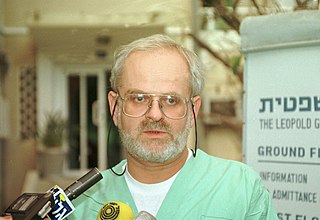
Oxycodone, sold under various brand names such as Roxicodone and OxyContin, is a semi-synthetic opioid used medically for treatment of moderate to severe pain. It is highly addictive and is a commonly abused drug. It is usually taken by mouth, and is available in immediate-release and controlled-release formulations. Onset of pain relief typically begins within fifteen minutes and lasts for up to six hours with the immediate-release formulation. In the United Kingdom, it is available by injection. Combination products are also available with paracetamol (acetaminophen), ibuprofen, naloxone, naltrexone, and aspirin.

Tel Aviv University is a public research university in Tel Aviv, Israel. With over 30,000 students, it is the largest university in the country. Located in northwest Tel Aviv, the university is the center of teaching and research of the city, comprising 9 faculties, 17 teaching hospitals, 18 performing arts centers, 27 schools, 106 departments, 340 research centers, and 400 laboratories. It is ranked 7th in the world by PitchBook data index.

Arthur Mitchell Sackler was an American psychiatrist and marketer of pharmaceuticals whose fortune originated in medical advertising and trade publications. He was also an art collector. He was one of the three patriarchs of the controversial Sackler family pharmaceutical dynasty.
The Graduate School of Biomedical Sciences is one of the eight schools that comprise Tufts University. The Graduate School of Biomedical Sciences (GSBS) is located on the university's health sciences campus in the Chinatown district of Boston, Massachusetts. The school was previously named the Sackler School of Graduate Biomedical Sciences but on December 5, 2019, the university announced it was removing the Sackler name from the school, because of the Sacklers' role in the opioid epidemic through their ownership of Purdue Pharma.
The Sackler Prize is named for the Sackler family and can indicate any of the following three awards established by Raymond Sackler and his wife Beverly Sackler currently bestowed by the Tel Aviv University. The Sackler family is known for its role in the opioid epidemic in the United States, has been the subject of numerous lawsuits and critical media coverage, and been dubbed the "most evil family in America", and "the worst drug dealers in history". The family has engaged in extensive efforts to promote the Sackler name, that has been characterized as reputation laundering. In 2023 the Sackler family's name was removed from the name of the Tel Aviv University Faculty of Medicine.

Purdue Pharma L.P., formerly the Purdue Frederick Company (1892–2019), was an American privately held pharmaceutical company founded by John Purdue Gray. It was sold to Arthur, Mortimer, and Raymond Sackler in 1952, and then owned principally by the Sackler family and their descendants.
Raymond Sackler was an American physician and businessman. He acquired Purdue Pharma together with his brothers Arthur M. Sackler and Mortimer Sackler. Purdue Pharma is the developer of OxyContin, the drug at the center of the opioid epidemic in the United States.
Eliezer (Eli) Schwartz MD, DTMH is an Israeli physician, known for his speciality in tropical diseases and travel medicine. He is a founding member of the International Society of Travel Medicine (ISTM) and served as chair of its Professional Education Committee. Schwartz is currently president of the Asia Pacific Travel Health Society (APTHS) as well as the Israel Society for Parasitology, Protozoology and Tropical Diseases (ISPPTD). At clinical practice, he is head of the Center for Travel Medicine and Tropical Diseases at the Sheba Medical Center. He is also a professor at the Sackler Faculty of Medicine, Tel Aviv University.

Yehuda Hiss is a retired Israeli pathologist. He served as the Chief Pathologist at the Abu Kabir Institute of Forensic Medicine between 1988 and possibly as late as 2005. Hiss has also served as part of the faculty for the Terrorism and Medicine Program at the Institute for Counter-Terrorism (ICT) at IDC Herzliya and in the Department of Pathology for the Sackler Faculty of Medicine at Tel Aviv University.
Mortimer David Sackler was an American-born psychiatrist and entrepreneur who was a co-owner, with his brothers Arthur and Raymond, of Purdue Pharma. During his lifetime, Sackler's philanthropy included donations to the Metropolitan Museum of Art, the Tate Gallery, the Royal College of Art, the Louvre and Berlin's Jewish Museum.
Reputation laundering occurs when a person or an organization conceals unethical, corrupt, or criminal behavior or other forms of controversy by performing highly visible positive actions with the intent to improve their reputation and obscure their history.

Richard Stephen Sackler is an American billionaire businessman and physician who was the chairman and president of Purdue Pharma, a former company best known as the developer of OxyContin, whose connection to the opioid epidemic in the United States was the subject of multiple lawsuits and fines, and that filed for bankruptcy in 2019. It has been claimed that Richard Sackler's Purdue is among "the worst drug dealers in history" and the Sackler family have been described as the "most evil family in America". The company's downfall was the subject of the 2021 Hulu series Dopesick and the 2023 Netflix series Painkiller.
Massachusetts v. Purdue is a lawsuit filed on August 14, 2018, suing the Stamford, Connecticut-based company Purdue Pharma LP, which created and manufactures OxyContin, "one of the most widely used and prescribed opioid drugs on the market", and Purdue's owners, the Sacklers accusing them of "widespread fraud and deception in the marketing of opioids, and contributing to the opioid crisis, the nationwide epidemic that has killed thousands." Purdue denied the allegations.
The Sackler family is an American family who owned the pharmaceutical company Purdue Pharma and later founded Mundipharma. Purdue Pharma, and some members of the family, have faced lawsuits regarding overprescription of addictive pharmaceutical drugs, including OxyContin. Purdue Pharma has been criticized for its role in the opioid epidemic in the United States. They have been described as the "most evil family in America", and "the worst drug dealers in history".
P.A.I.N. is an advocacy organization founded by artist Nan Goldin to respond to the opioid crisis, specifically targeting the Sackler Family for manufacturing, promoting, and distributing the drug Oxycontin through their corporation Purdue Pharma LP.

The timeline of the opioid epidemic includes selected events related to the origins of Stamford, Connecticut-based Purdue Pharma, the Sackler family, the development and marketing of oxycodone, selected FDA activities related to the abuse and misuse of opioids, the recognition of the opioid epidemic, the social impact of the crisis, lawsuits against Purdue and the Sackler family.
Joss Sackler is a fashion designer. She is also known for her marriage to David Sackler, whose father Richard Sackler was the chairman and president of Purdue Pharma, and oversaw its manufacturing of the highly addictive opioid Oxycontin, a leading drug in the opioid epidemic.
Curtis Wright IV is an American former government official known for his role in the Food and Drug Administration's approval of OxyContin for Purdue Pharma in 1995, followed by his subsequent employment by the company, which led to portrayals in films and reports in nonfiction books, magazines, and news media outlets of his alleged role as one of the key figures in the current opioid epidemic in the United States. Wright was implicated in a criminal conspiracy outlined in a 2006 United States Department of Justice review document that was first made public in Purdue Pharma's 2019 bankruptcy proceedings. Although that case was settled in a 2007 plea agreement deal, members of United States Congress have requested the full 2006 documentation from the Department of Justice with the goal of opening a new case based upon the evidence then gathered. Parts of Wright's sworn depositions in 2003 and 2018 have internal contradictions and differ from documentary evidence described the 2003–2006 U.S. Federal Government investigation into Purdue Pharma.
Harrington v. Purdue Pharma L.P.,, is a pending United States Supreme Court case regarding Chapter 11 of the Bankruptcy Code. This case is about the settlement by Purdue Pharmaceutical for Opioid victims who overdosed with the OxyContin drug produced by their company.







